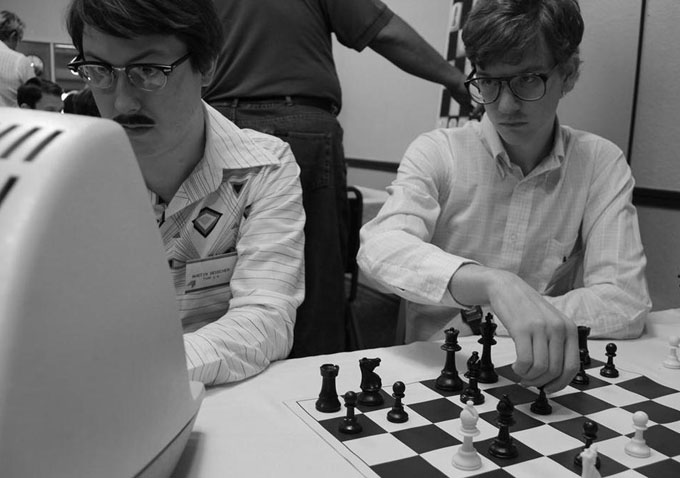 The first thought upon sitting
The first thought upon sitting
down for “Computer Chess” might be one of snobby resistance. Director Andrew
Bujalski has been credited as the godfather of mumblecore, a movement that has
produced a number of interesting pictures but one that still invites scorn for
supposedly lowering the discourse of independent filmmaking. As usual, here
he’s working with a collection of non-actors, though they may be the least
photogenic bunch he’s ever shot: there’s certainly no one as bewitching as “Funny
Ha Ha” star Kate Dollenmayer, or even as intriguingly polysexual as Alex Karpovsky
in “Beeswax.” It’s a period picture taking place in 1980 and the
film is shot on video using the technology of that era, giving the picture a
fuzzy cable access look. Movie tickets cost a lot of money so when you
see a visual like that, there’s a tendency to blanch, but what does it mean
that with all those ingredients, “Computer Chess” might be the most charmingly
entertaining, funniest movie of the summer?
Bujalski’s film almost
entirely takes place within the confines of a shabby motel, where a collection
of tech geeks have converged to design code that can allow computers to compete
with humans in a game of chess. Far from trading barbs and getting laid, this
collection of CPU jockeys are as awkwardly uncomfortable with each other as
they are in their own skin. Their discussions are single-minded, concentrated
on the evolution of this technology and its ability to match our abilities. In
this world, nothing is handheld or pocket-sized, and computers are massive,
cumbersome pieces of equipment that we’re almost openly daring (some
pessimistically) to reach our level.

Though an ensemble picture,
the events mostly center on Peter (Patrick Riester), an anxious young
programmer who is overwhelmed by the competitive nature of the weekend. His
conversations often involve him allowing another, more forceful personality to
lead the dance, and more than once he seems overwhelmed, enough that he almost
ends up in bed with two pushy New Age swingers sharing the space during
off-hours for spacey healing sessions. Peter mostly develops chemistry with
mousy Shelly (Robin Schwartz), who finds herself constantly trumpeted as the
first female at the annual event the way someone would celebrate a dog would
ride a bicycle. Her presence is a tell, of course, one suggested in dialogue at
one point when she is condescendingly told to bring more female friends; the
world these characters inhabit is expanding.
Proof of this includes one
blustery groupie, a portly, aggressive man who tools around the chess matches
as a borderline luddite, trading joints and spreading Cold War theories. His
presence is less a member of the group and more a figure of orbit, allowing
most of the characters to cross paths, none more so than the unforgettably grody
Michael Papageorge (Myles Paige), a self-absorbed attention-hog who refuses to
admit (to himself?) that he hasn’t even bothered to pay for a motel room. After
failed attempts to interfere with the lives of everyone at the conference, he
existentially wanders the halls like a misplaced ghost seeking purpose. Paige
is having a ball playing a character who seems perplexed that people don’t
openly welcome his presence; equally enthused is James Curry, who plays Les, a
portly British programmer who pops his collar after hours and exhibits a chatty
nerd sex appeal.
 What Bujalski’s film dances
What Bujalski’s film dances
around is that, in part, these guys are the architects of the modern world.
What’s amusing is how they think they know that, but not in how we’re aware:
there’s endless whispers about the interest shown by the military, with a lot
of conspiratorial double-speak about the interest of shadowy figures that
likely represents the efforts of a few pointdexters to sex up a weekend getaway.
Instead, the bulk of the three day retreat is spent pushing and pulling massive
computer equipment up stairs, onto elevators, and into trucks. Well, that and
keeping the kleptomaniacal Papageorge out of their rooms.
Bujalski has shown himself to
be a filmmaker of increasing skill with each new picture. And despite the
greatness of this film, there’s something amusing about the idea that he
probably feels a black and white shot-on-outdated-video story about nerds in a
motel playing computer chess is maybe his most commercial idea. Upon seeing the
film, however, that’s no longer a gag. His earlier work marked Bujalski as a skilled,
interesting filmmaker, and the endlessly surprising, often riotously funny “Computer
Chess” basks in the details of a group of men who, at a key point in history,
are asking themselves not only if they can accomplish something, but why, and
what it means to their current generation. It’s the first sign that “good” is
no longer the template; Bujalski is now a great filmmaker. [A]






As a member of the Computer Chess cast (and a film critic), I would like to say this was one of the smartest, most perceptive pieces I have read on the film. Thanks, Gabe! Gerry
I am looking very forward to watching this film. I really enjoy indie films, especially Andrew Bujalski's work, and this one looks so funny and unique. Going to add this on my must-see list!